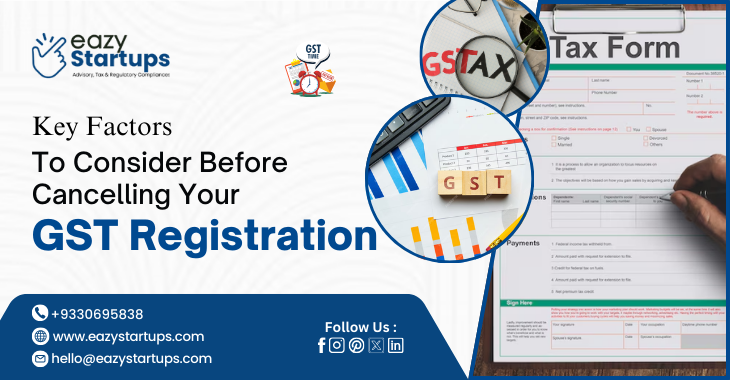If you are a business owner in India, consider opting for GST Registration Cancellation. Maybe your business has closed, or your turnover has dropped below the GST limit. Whatever the reason, cancelling GST registration is not just about filling out a form. There are important things you need to know before taking this step.
Here are some key factors to consider before cancelling your GST registration:-
1. Are You Eligible to Cancel Your GST Registration?
2. Clear All Pending GST Returns
3. Settle Any Outstanding Tax Dues
4. Impact on Input Tax Credit (ITC)
5. How Cancellation Affects Your Business
6. The Process Takes Time
7. Reapplying for GST in the Future
Are You Eligible to Cancel Your GST Registration?
Not everyone can cancel their GST registration. You can apply for cancellation if:-
- Your annual turnover is below ₹20 lakh (for most states) or ₹40 lakh (for goods in some states).
- You have stopped doing business.
- You have switched to a different tax system, like the Composition Scheme.
- The GST department has cancelled it due to non-compliance.
Before applying, check if you meet the eligibility criteria to avoid unnecessary delays.
Clear All Pending GST Returns:
Before opting for GST Registration Cancellation, you must file all pending returns. It includes:
- GSTR-1 (for outward supplies).
- GSTR-3B (monthly/quarterly tax summary).
- Final GST return (GSTR-10) after cancellation.
If you skip these, your cancellation request may be rejected, and penalties may apply.
Settle Any Outstanding Tax Dues:
If you have unpaid taxes, clear them before applying for cancellation. The government will not process your request if there are outstanding dues. Even if your business is not running, you must pay any pending GST liabilities.
Ignoring this can lead to interest, penalties, and legal trouble. It is better to check your tax records and pay any pending amounts on time.
Impact on Input Tax Credit (ITC):
Once your GST registration is cancelled, you lose the right to claim Input Tax Credit. This means you cannot get refunds for the GST you paid on purchases.
If you have unused ITC, use it before cancellation. Also, if you have stock, you may need to pay tax on the remaining goods as per GST rules.
How Cancellation Affects Your Business:
If you opt for GST Registration Cancellation, you can no longer charge GST on sales. It might affect your business, especially if you deal with GST-registered clients. Some businesses prefer to work with GST-registered vendors to claim ITC. Before cancelling, consider whether it will impact your customer base and sales.
The Process Takes Time:
GST cancellation is not instant. After you apply, the GST officer reviews it. If everything is correct, they approve the cancellation. But they may reject your request if there are pending filings or errors.
The cancellation is usually processed in 30-60 days. Be patient and check the status regularly on the GST portal.
Reapplying for GST in the Future:
Once you cancel your GST registration, you cannot reactivate the same GSTIN. If you restart your business or need GST again, apply for a new registration. It involves fresh documentation and verification. Many business owners cancel GST only to realize they need it later, leading to delays. Before cancelling, consider whether you might require GST registration again in the Future.
Conclusion
Cancelling your GST registration is a big decision. Clear your tax dues, file pending returns, and understand how it will impact your business. If you are unsure, consult a tax expert before applying. Preparation can help you avoid future problems and smooth the process.
If you have decided to cancel your GST registration, follow the steps and comply with GST rules. For professional help with the GST Registration Cancellation Online in India, reach out to Eazy Startups today. We handle everything from documentation to final approval, ensuring a smooth and stress-free process. Contact us today for expert assistance with GST cancellation!

